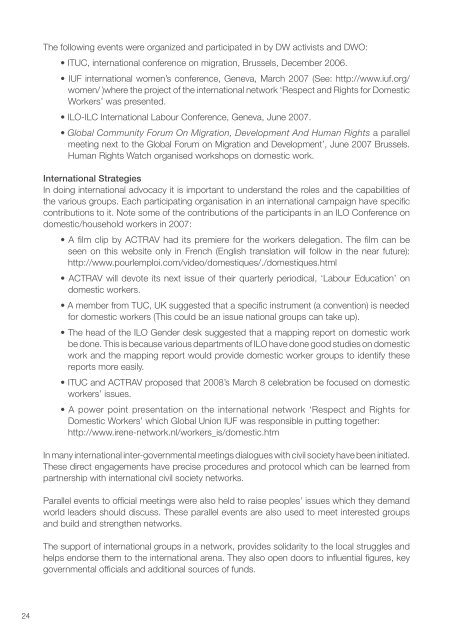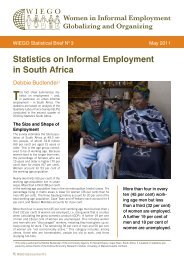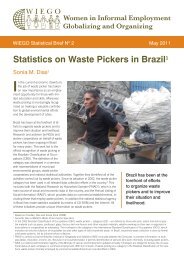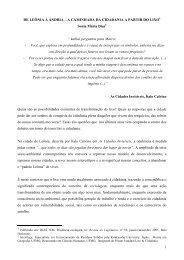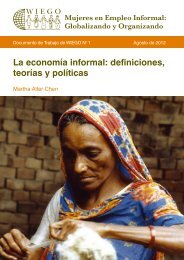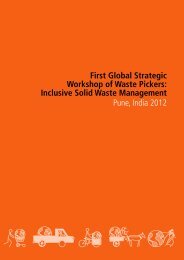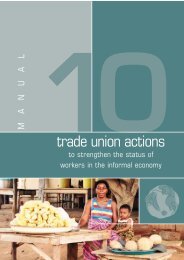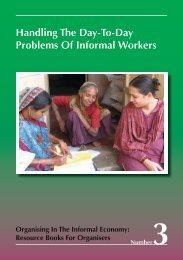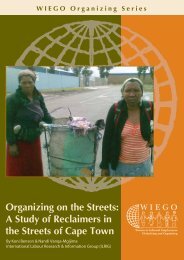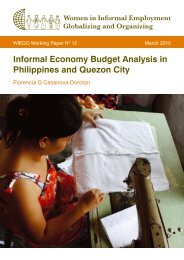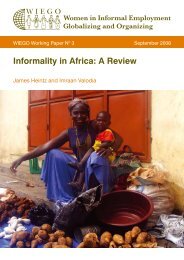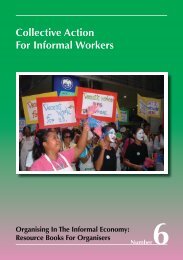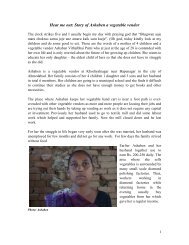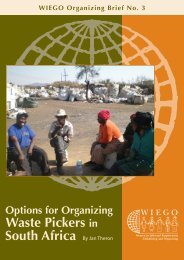Manual for Domestic Workers: Organizing a Better - Inclusive Cities
Manual for Domestic Workers: Organizing a Better - Inclusive Cities
Manual for Domestic Workers: Organizing a Better - Inclusive Cities
You also want an ePaper? Increase the reach of your titles
YUMPU automatically turns print PDFs into web optimized ePapers that Google loves.
The following events were organized and participated in by DW activists and DWO:<br />
• ITUC, international conference on migration, Brussels, December 2006.<br />
• IUF international women’s conference, Geneva, March 2007 (See: http://www.iuf.org/<br />
women/ )where the project of the international network ‘Respect and Rights <strong>for</strong> <strong>Domestic</strong><br />
<strong>Workers</strong>’ was presented.<br />
• ILO-ILC International Labour Conference, Geneva, June 2007.<br />
• Global Community Forum On Migration, Development And Human Rights a parallel<br />
meeting next to the Global Forum on Migration and Development’, June 2007 Brussels.<br />
Human Rights Watch organised workshops on domestic work.<br />
International Strategies<br />
In doing international advocacy it is important to understand the roles and the capabilities of<br />
the various groups. Each participating organisation in an international campaign have specific<br />
contributions to it. Note some of the contributions of the participants in an ILO Conference on<br />
domestic/household workers in 2007:<br />
• A film clip by ACTRAV had its premiere <strong>for</strong> the workers delegation. The film can be<br />
seen on this website only in French (English translation will follow in the near future):<br />
http://www.pourlemploi.com/video/domestiques/./domestiques.html<br />
• ACTRAV will devote its next issue of their quarterly periodical, ‘Labour Education’ on<br />
domestic workers.<br />
• A member from TUC, UK suggested that a specific instrument (a convention) is needed<br />
<strong>for</strong> domestic workers (This could be an issue national groups can take up).<br />
• The head of the ILO Gender desk suggested that a mapping report on domestic work<br />
be done. This is because various departments of ILO have done good studies on domestic<br />
work and the mapping report would provide domestic worker groups to identify these<br />
reports more easily.<br />
• ITUC and ACTRAV proposed that 2008’s March 8 celebration be focused on domestic<br />
workers’ issues.<br />
• A power point presentation on the international network ‘Respect and Rights <strong>for</strong><br />
<strong>Domestic</strong> <strong>Workers</strong>’ which Global Union IUF was responsible in putting together:<br />
http://www.irene-network.nl/workers_is/domestic.htm<br />
In many international inter-governmental meetings dialogues with civil society have been initiated.<br />
These direct engagements have precise procedures and protocol which can be learned from<br />
partnership with international civil society networks.<br />
Parallel events to official meetings were also held to raise peoples’ issues which they demand<br />
world leaders should discuss. These parallel events are also used to meet interested groups<br />
and build and strengthen networks.<br />
The support of international groups in a network, provides solidarity to the local struggles and<br />
helps endorse them to the international arena. They also open doors to influential figures, key<br />
governmental officials and additional sources of funds.<br />
24


